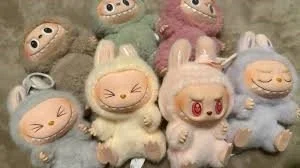Beyond the Numbers: The 'Lipstick Effect' and Other Hidden Economic Indicators
People who find themselves in the Melbourne CBD often would have seen this long line down Bourke Street a few weeks ago, where people were lining up to get a turn at buying the most popular collectible in the world. Forget about the Pokemon cards, coin collecting or stamps, Labubus are where all the rage is at the moment.
This tiny doll whose popularity exploded when Lisa from the Korean group BLACKPINK started carrying it around everywhere. As expected, the price quickly shot up, reselling up to $230,000 in one instance.
If this trend seems familiar, you’ve now privy to the psychology of humans in times of uncertainty.
This phenomenon is part of a broader behavioral trend known as the lipstick effect—a term coined by Estée Lauder’s Leonard Lauder in the early 2000s. It describes how, during economic downturns, consumers shift from big-ticket luxury items to smaller, emotionally satisfying purchases like lipstick which are much more attainable than say purchasing a house. These purchases offer a sense of control, empowerment, and identity at a time when larger financial goals feel out of reach.
Similarly, the hemline index, a theory dating back to the 1920s, suggests that skirt lengths correlate with economic conditions—shorter in boom times, longer in recessions. While not scientifically rigorous, the recent resurgence of modest fashion and oversized tailoring may reflect deeper economic anxieties. These days, this trend is translated to ‘quiet luxury’ – a movement that rejects logos and loud branding in favor of minimalism, craftsmanship, and timeless basics. Think about the time when people were going out to clubs in business casual outfits (blazer in a club??). The underlying theory is the multi-function aspect of your clothes so that you do not have to spend more towards different things.
These indicators are more than quirky trends—they reflect a psychological need to feel in control. Buying a lipstick or a Labubu figurine becomes a way to assert control in a world that feels increasingly unpredictable
Financial Sentiment and Insecurity in Australia
In Australia, this psychological recalibration is playing out against a backdrop of deep financial pessimism. According to Monash University’s Australian Consumer and Retail Studies (ACRS), Australians are spending more on essentials like housing, insurance, and groceries, while cutting back on discretionary items.
Live your Life
There’s nothing wrong with treating yourself to your favorite things or buying a lipstick that makes you feel good about yourself. Casting your memory back to the divisive quote by Tim Gurner about how the $19 avo toasts and $4 coffees are what is keeping Australians from being able to buy a house, life is all about balance.
At IWP, we focus on helping people be conscious of their spending and not casting a judgement on the little things they are spent on. There is knowledge in understanding where your money is going to help you keep on track of your goals, however you do not need to cut out the small luxuries in life as what truly matters at the end of the day is being able to enjoy your life not just later in life, but also in the now. After all, what is life without a good cup of coffee at your favorite café on the weekend?
General Advice Warning
The information in this article is general advice only. It does not take into account your objectives, financial situation or needs. Before acting on any information, you should consider the appropriateness of the information provided and the nature of the relevant financial product having regard to your objectives, financial situation and needs. You should seek independent financial advice to discuss your personal circumstances.




